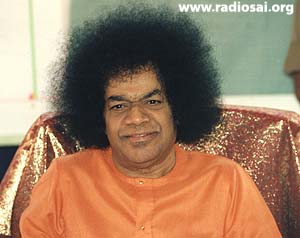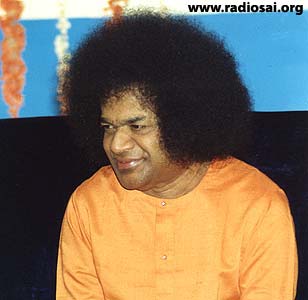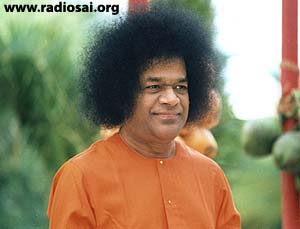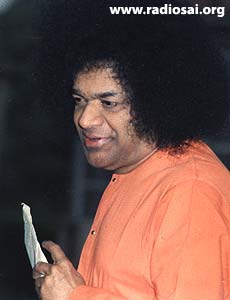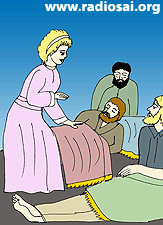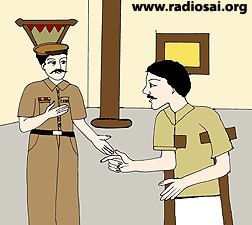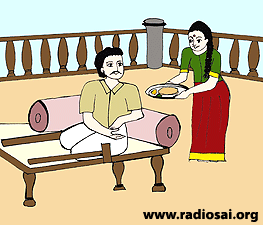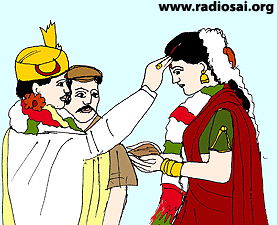 |
 |
 |
Volume
6 - Issue 08
AUGUST - 2008 |
CONVERSATIONS WITH SAI Satyopanishad - part 7:
CHAPTER 2 - TRENDS IN SOCIETY Anil Kumar: Swami! Many speak of culture? What is the value of culture? Bhagavan: Culture is very important because your life and its value depend on it. Culture is a way of life. It enables you to experience divinity in your life and realise unity in diversity. Without culture, a person becomes a demon. He falls down in stature and ultimately ruins himself/herself.
You know that sea water is saline or salty. Human life is like a vast sea. God's grace is like sunlight that falls on the sea. The seawater, because of the heat of the sun, becomes vaporised. This is the vapour of bliss that settles as clouds in the sky to fall down to the earth as rain. It is the rain of love. The seawater is salty but the rainwater is sweet. Why? Where does the difference lie? Seawater is refined by sunlight. So also, our life must be cultured and refined. The value of life will then rise. A piece of iron worth less than a rupee can be made into a beautiful and expensive watch after it is processed and refined. This is due to the culture it has undergone. So long as a boulder remains itself, it is bound to be neglected. But, once it is in the hands of a sculptor, chiseled and hammered, and shaped into a beautiful Krishna idol; it starts receiving respect and worship. Why? It is only culture that makes all the difference. A boulder, once trodden by everyone underfoot, now in the form of an idol, occupies a place at the altar in a temple and is worshipped everyday. This is the value that culture confers. Without culture, one develops a foolish view of life finding diversity in unity. For example, take a needle. It stitches pieces of cloth into a garment. The needle stands for culture. But scissors cut the cloth into pieces. This is the condition in the absence of culture. Anil Kumar: Swami! Have people come closer to God in this modern world?
Bhagavan: The modern world is completely superficial and artificial. Outwardly, all say 'hello', 'hello' to each other. Everyone says 'thanks' for every small thing. This is all mechanical, routine courtesy, and those words don't mean anything. You find utter selfishness everywhere. Modern science has enabled man to land on the moon. But, man has forgotten to step into his neighbour's house. Yes, he can reach chandra, the moon, but can't see Ramachandra (God) in his heart. Modern man can swim in water like a fish, and fly like a bird, but can't walk a mile with his two legs on the ground. With his physical eye, which is not even two inches in size, he is able to see a galaxy several thousand miles away from him, but he is not able to see himself. The eye and the ear are so near but they don't see each other! Do they? God reclines on the ksirasagara, 'ocean of milk' located in your Heart, but today we find that the 'Heart' has become ksarasagara, 'ocean of poison'. How do you expect him to realise Divinity? Even after having become a very rich country, France, lost the Great War. Why? It was because of her reckless youngsters and the vices of the day. This trend is increasing today among people. Man is living and working for the fulfillment of his asalu, lowly desires, but he should live for asayalu, ideals. People with high ideals alone can come closer to one another spiritually. Anil Kumar: Swami! How can we come up in life?
Bhagavan: You have to work for it. It may be difficult, but it is desirable to achieve it. In fact, everyone should strive to come up in life, therefore, it is said, 'Aim high. Low aim is a crime'. One has to travel in the right direction and reach the goal. This is the purpose of the birth of every human being. Man has to realize that he is essentially divine. One has to attain Divinity. But this is not as easy and as simple as it seems. After all, a fall is easy and quick too. Take this example. As you come to Kodai Kanal by bus climbing the hills, the vehicle makes a lot of noise. Lorries also struggle and make loud sounds climbing these hills. But, the very same bus or lorry finds it easy to go downhill. So is the case with human life too! You have to struggle and work hard to come up in life. But to fall from a height and ruin yourself is easy, simple, and quick. Take another example. When you shoot an arrow, the more you pull it backwards closer to the string, the farther the arrow goes when released. Similarly, if you work more, your success will be equally greater. A rocket, the moment it is launched with force, jerks backwards and thereafter it gets released into space where it rises with burning flames. So, in life the amount of effort you put in decides your rate of success. Anil Kumar: Swami! Kindly tell us how to achieve greatness in life?
Bhagavan: Never allow this sort of idea to get into your head. You are mistaken if you think that you have achieved something very special and unique by becoming great. It is not true at all. Becoming great in life should not be your aim. There are several great people in society. I don't think this is important or matters the most. Goodness is superior to greatness. Instead of aiming to be great, try to be good. It is far more important to be a good man than a great man. What is the difference between the two? A great man sees man in God, while a good man sees God in man. Ravana, as portrayed in the Ramayana, was undoubtedly a great man. He considered Rama, the Lord, a mere man. But, Rama was an ideal good man. He saw divinity in a bird like Jatayu, in squirrels, and even in demons like Vibhishana. Even women like Sabari, illiterate people like Guha as well as saints appeared to Rama like His own reflections. So, Rama was good. You should try to get the reputation that you are a good man and not a great man. Anil Kumar: Swami! What is an ideal government? Bhagavan: In an ideal government everyone willingly observes the rules and regulations of the State. Everybody discharges his or her responsibilities. 'Godment' is superior to Government. But, today we see people fighting for their rights, forgetting their duties. You should not give any scope for laziness. All employees should work most sincerely doing justice to the salaries they receive every month. Otherwise, it will amount to cheating or betraying their fellow beings or the government. People should cultivate samarasyam, integration, samagrata, coordination, samaikyata, unity, and saubhrdtrata, fraternity.
Look at this piece of cloth. This is very strong because the threads are closely interwoven. But if you separate the threads, you can cut it with your finger. Everybody should know that strength lies in unity. India could achieve independence but not unity. You are free to walk waving your walking stick, so long as it does not hit the nose of another pedestrian and your freedom does not rob the independence of others. Fundamentals applicable to all must be followed. The individual is less important than the community or society. It is always better that you manage to employ yourselves in learning those things that are needed for society. Your education should help you to better the community. Anil Kumar: Swami! This gentleman is a famous journalist. Many say that he reports well for the newspapers. Bhagavan: Is that so! Good! Who is a journalist? He who writes a general list of matters in papers is a journalist. What is news? All the information from North, East, West and South form news. It is good to know the news that comes from the outside world. What about nuisance that comes from within you? Know that and correct yourself. Anil Kumar: Swami! What is essential for us now? Bhagavan: If you have love, it is enough. Everything will be added unto you. Service, sacrifice, humility, devotion, discipline, etc. are contained within love. It is only love that prompts and promotes all virtues. Where there is love, there will be no ego, hatred, jealousy and such other low and mean animal qualities. There was a lady in Paris. She led her life with the little money she had. One day she saw some helpless footpath dwellers shivering in the cold. She was deeply moved by this sight. Everyday she used to take a few blankets along with her and offer them to those poor, needy and forlorn.
This had gone to the notice of the elders and finally the government. They decided to honour her. A few youngsters came to her to congratulate her. She said that she was not happy since she could not help everyone, when the compassionate Almighty God was helping everyone always. She further added that she felt ashamed and frustrated, as her help could not be extended to everyone. I will tell you another story. There was in an army a soldier who lost both his legs in a war and had to move with the help of crutches. Since his service was relatively short, he was not eligible for all the retirement benefits. The Major of his unit gave him some money and asked him to return.
The soldier, on his way back home, had to stop in a village and take shelter in a choultry as it was raining heavily. The money on hand also was exhausted. Next morning, a schoolgirl happened to pass the same street, saw this soldier, and made enquiries. The girl was deeply moved by his plight. Since then, she used to go to school an hour early everyday, collect some fruits on the way, sell them, and purchase a few chapatis for the soldier.
After a couple of weeks, the Major happened to pass the same way and noticed the soldier. The major was surprised to see him, for even after a long time he had not yet reached home. He found that it was due to paucity of funds. The Major also learnt how the soldier was managing himself all these days. In the meantime, the girl came and served chapatis to the soldier. The Major followed her and went to her house. On seeing him, her parents thought that their daughter must have done something wrong and therefore he had come to make an enquiry. When they were about to punish her, the Major intervened and said to her parents, "You are indeed very lucky! How many of us have such children with magnanimity, love, concern for the needy, and the spirit of service?" He was about to give some gold coins to her parents who said, "Sir! We don't want all this. We can live with our hard earned money. Who can guard these gold coins at home? Please leave us alone, Sir!" The Major felt happy and left for his native place where he found an eligible bridegroom for this girl and performed her marriage. This is the true wealth of love. 'Expansion of love is life. Contraction of love is death'. - END OF CHAPTER 2 - (To be continued) - Illustrations: Ms Vidya, Kuwait – Heart2Heart Team
|
Vol 6 Issue 08 - AUGUST 2008
|
Best viewed in Internet Explorer - 1024 x 768 resolution. |

